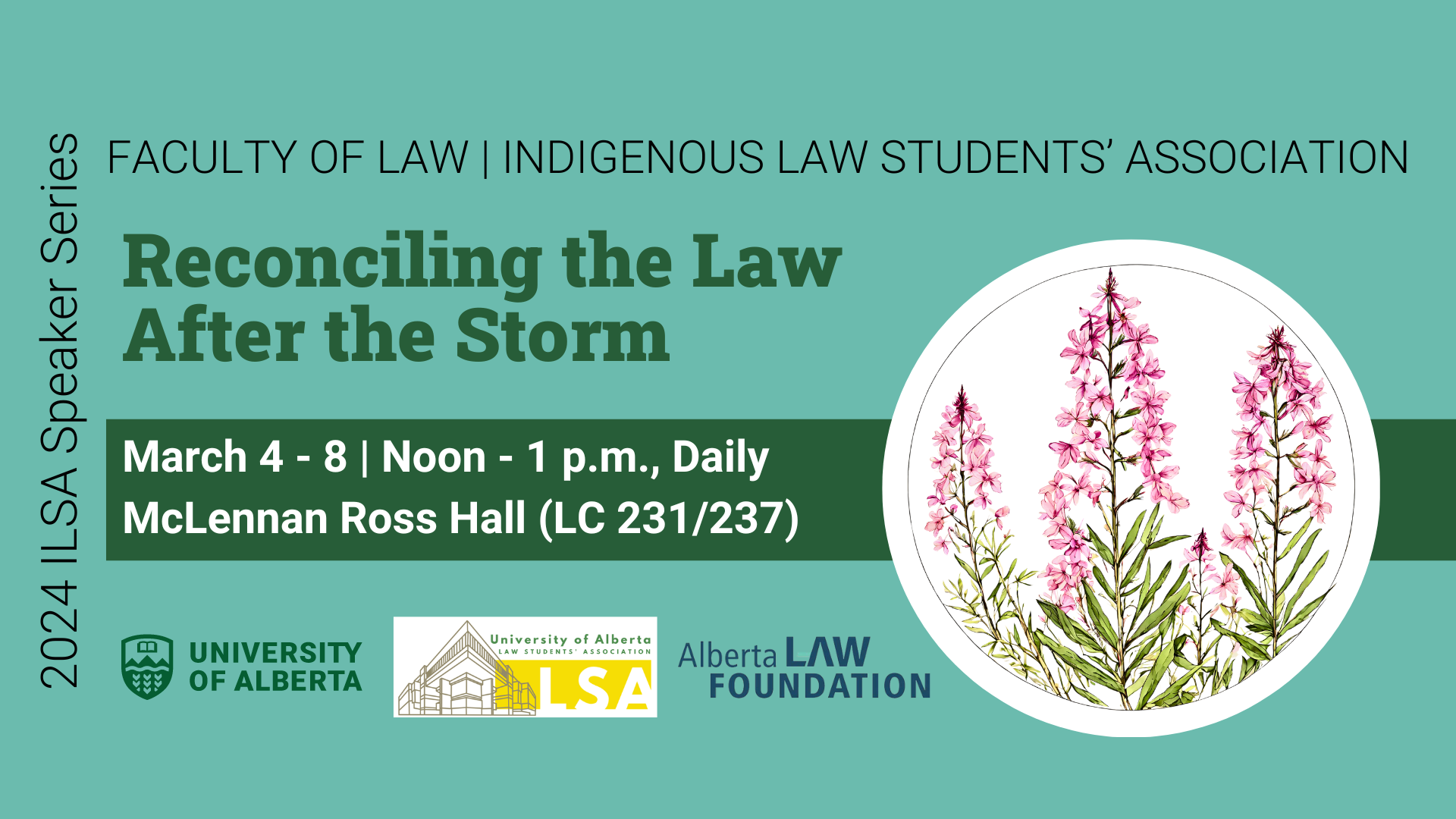2024 ILSA Speaker Series
March 4 - 8, noon daily | McLennan Ross Hall (LC 231/237) & Virtually
Lunch provided (while supplies last)
Join the Indigenous Law Students' Association and the University of Alberta Faculty of Law for the 2024 Speaker Series! Each day, hear from renowned experts and leaders in Indigenous law as they share their knowledge, experience and perspectives.
This year's theme is Reconciling the Law After the Storm. Last year, the ILSA Speaker Series focused on Having the Courage to Face the Storm. This year, our speakers will be discussing reconciling, rebuilding and renewing once the storm has passed. How can we reconcile these Indigenous laws that have always existed here with the statutory and common law of the Canadian state? How might the multi-juridical future of Canada look?
Join us March 4 through March 8, between noon and 1:00 p.m., to hear from this year's incredible lineup! You are invited to attend in-person or virtually via Zoom.
Lunch Provided (while supplies last).
The 2024 ILSA Speaker Series is supported by the ATCO Endowment in Aboriginal Law.
Speakers
March 4: Lisa Weber
Lisa will speak about her experience with several First Nations and their journey toward resuming jurisdiction for child and family well-being according to their own laws, referencing the impact of the recent Bill C-92 decision.
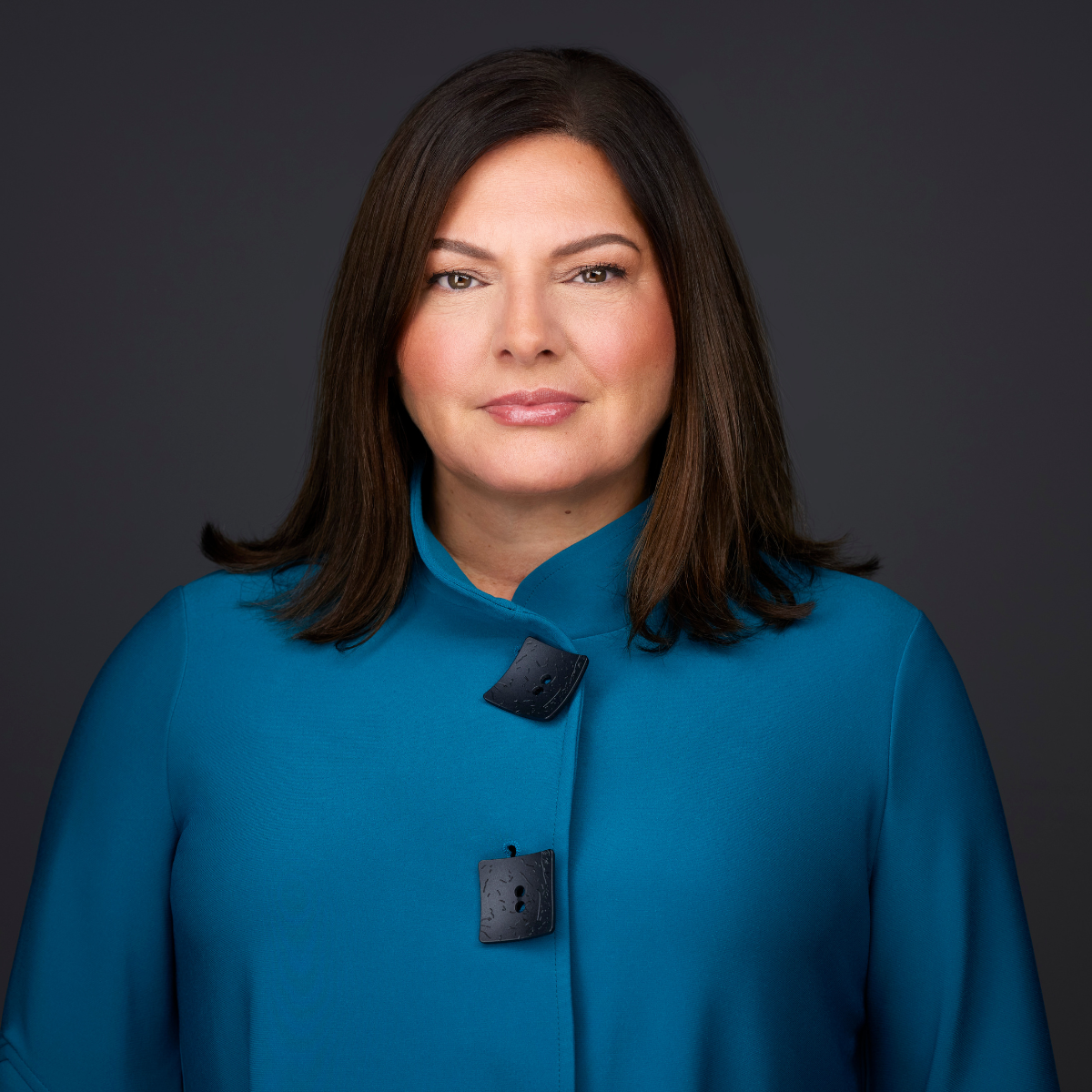 Lisa Weber is an alumna of the Faculty of Law, having received her LL.B. from the University of Alberta in 1999. She subsequently completed her Master of Laws in 2005 from the University of Manitoba, and is a member of the Alberta bar, and member of the Law Societies of British Columbia and Manitoba.
Lisa Weber is an alumna of the Faculty of Law, having received her LL.B. from the University of Alberta in 1999. She subsequently completed her Master of Laws in 2005 from the University of Manitoba, and is a member of the Alberta bar, and member of the Law Societies of British Columbia and Manitoba.
Lisa has been a practicing lawyer for 20+ years. Notable work includes her near-decade involvement as an adjudicator and then Deputy Chief Adjudicator, presiding over Indian residential school hearings and appeals through western Canada and the NWT; her role as counsel for the Institute for the Advancement of Aboriginal Women in the National MMIWG Inquiry and in the R. v. Barton case at both the Alberta Court of Appeal and the Supreme Court of Canada; and participation as a Commissioner with the Metis Nation Constitution Commission. Relevant to the topic she will be speak of, is her current practice working with and for numerous First Nations who are at various stages of writing and exercising jurisdiction for child and family well-being pursuant to their inherent and treaty rights. She has participated as lead legal counsel representing Nations negotiating tri-lateral and bi-lateral funding agreements to implement their laws.
In 2018 Lisa received the National Zenith Lexpert Mid-Career Excellence Award for her national achievements in Aboriginal Law. In 2019 she received a Social Justice Award and Leadership Award for her advocacy work in pursuing justice for Indigenous women.
Lisa is Cree-Metis. She currently resides in the Edmonton area, with family ties to the northern Alberta communities of Calling Lake, Lac La Biche, and Paddle Prairie Metis Settlement. She is a mother of five and grandmother of four.
March 5: Eleanore Sunchild
Lessons Learned Thus Far Being An Indigenous Woman Lawyer in a Colonial System and Stories of Healing and Love
Eleanore Sunchild is a proud member of the Thunderchild First Nation. She graduated from the University of Alberta, Faculty of Law in 1998 and has been a member of the Saskatchewan Bar since 1999. Eleanore has a political science BA and attended the Faculté St. Jean, at the University of Alberta for two years.
Eleanore is the sole owner of Sunchild Law, located in Saskatoon and specializes in Indigenous Law. Eleanore advocates and speaks about the inclusion of Indigenous Peoples in the Canadian criminal legal system and has successfully pursued wrongful death actions and civil actions for those who have been unjustly harmed. She continues to represent the Boushie/Baptiste family and has become a strong voice for Indigenous people. She also represented thousands of Indian Residential and Day School survivors in settlement proceedings.
Eleanore is sought after for her knowledge of the Indian Residential and Day school systems and the continuous impacts of colonization on Indigenous Peoples. She has presented nationally and internationally on the legacy of the Indian Residential School system, the impact of colonial policy in Canada, and the injustices endured by Indigenous peoples. She has presented at all levels of Canadian Courts and internationally at the United Nations Permanent Forum on Indigenous Issues on the systemic racism in the Canadian justice system.
In 2021, Eleanore was named the Saskatchewan Trial Lawyer of the Year, and in 2024, she received the Canadian Bar Association Distinguished Service Award.
She has a family of 5 children and a husband, Tony. She enjoys being a hockey mom and riding motorbikes!
March 6: Judge Gerald Morin
Judge Morin will discuss the Indigenous Courts in Canada and how they are helping to shape a multi-juridical future. He will draw on his experience with the Canadian legal system and the Cree-speaking Court Circuit during his years as a judge.
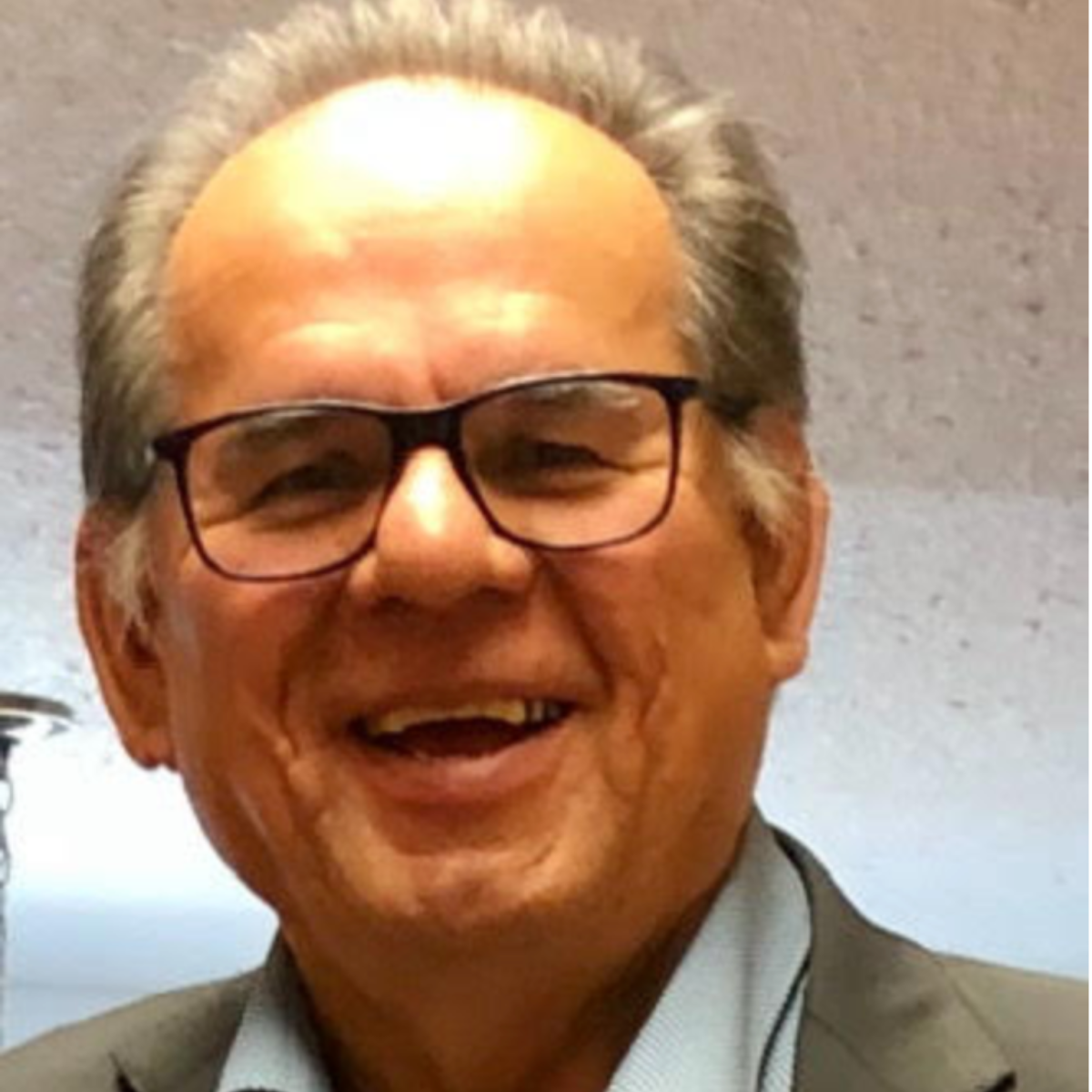 Judge Morin is a member of the Peter Ballantyne Cree Nation, and he is fluent in 3 Cree dialects -N,Th and Y. He was born and raised in Cumberland House. He left home when he was 16 to attend highschool and onto other secondary education (Certificate of Social work program (Saskatoon)1972-73; Certificate of Social work /bachelor program, 1978; LLB, University of Sask, 1987).
Judge Morin is a member of the Peter Ballantyne Cree Nation, and he is fluent in 3 Cree dialects -N,Th and Y. He was born and raised in Cumberland House. He left home when he was 16 to attend highschool and onto other secondary education (Certificate of Social work program (Saskatoon)1972-73; Certificate of Social work /bachelor program, 1978; LLB, University of Sask, 1987).
Including his education, he has worked in the Criminal Justice field for 50 years as probation officer, social worker, assistant professor School of SW, U of Man; private practitioner (law), Provincial Court Judge (Cree Court) 2001–(April) 2023; Deputy Judge NWT 2006-2023, Deputy Judge Yukon 2016-2023. Started the Wanusweh lecture series at the College of Law 2012. This forum was developed when Judge Morin noticed a gap in the legal lecture forum for Indigenous lawyers and academics to discuss Indigenous legal topics. He has had distinguished guests such as Honourable Murray Sinclair, Cindy Blacklock, Prof Jeff Hewitt, IPC, Prof Marilyn Poitras, Justice Tony Mandamin, Prof Drake, Derrick Nepinak, Jean Teillet, IPC, David Nahwegahbow, IPC, and others.
He has been recognized with the following designations: Kings Counsel (KC) 1999; Sask Law Society, Willy Hodgson Indigenous legal award 2003; University of Sask, Alumna Achievement award 2018; Order of Canada (OC) officer, 2022; Indigenous Peoples Counsel (IPC) 2023.
March 7: Darian Baskatawang
Darian Baskatawang will discuss the importance of clean water and how colonial and Indigenous law can work together on this important issue.
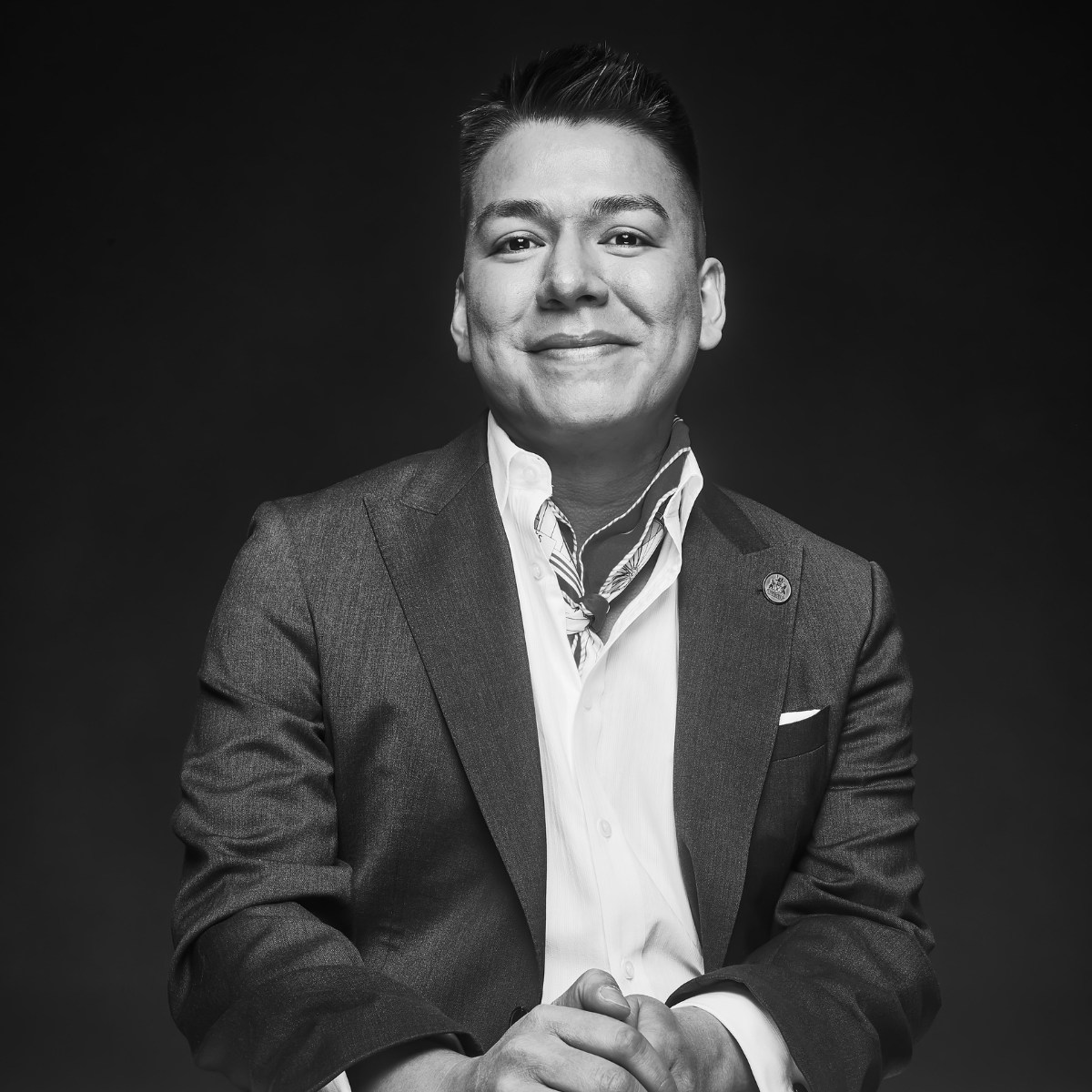 Darian Baskatawang is an Associate and Class Counsel for the First Nations Drinking Water Class Action settlement agreement. He is a two-spirit Anishinaabe man of the Loon clan in Whitesand First Nation.
Darian Baskatawang is an Associate and Class Counsel for the First Nations Drinking Water Class Action settlement agreement. He is a two-spirit Anishinaabe man of the Loon clan in Whitesand First Nation.
Darian grew up on a small reserve in northern Ontario, surrounded by the wisdom and care of cousins, aunties, uncles, grandmas and grandpas. He was mentored by his community’s advocates and attended meetings on behalf of Whitesand from an early age, first starting at the age of 13.
As a young advocate, Darian volunteered as a youth representative for the Independent First Nations and Chiefs of Ontario on top of his school work. Like many Indigenous youth, Darian advocated with community in mind and considerations for how children and youth can achieve their full potential. As representative from the Independents, Darian sat on the Leadership Council of the Chiefs of Ontario and maintained portfolios in education, child welfare, and justice. He focused on advocacy for children and youth believing that they alone are our fortune and sole hope for the future. Darian is guided by values and principles his great-grandmother taught him, which knit Indigenous nations together: kindness, humbleness, respect, collaboration and laughter.
After a few years as a youth representative from the Independent First Nations and Chiefs of Ontario, Darian began further advocacy in roles advising federal and provincial cabinet ministers, and the leaders of both orders of government. He has held roles working in the Office of the Prime Minister of Canada and advising former Premier of Ontario Kathleen Wynne.
Darian maintains a broad practice in First Nations governance and jurisdiction, class actions, child welfare, land claims and community emergency matters. When he’s not working, Darian enjoys runs along dirt roads, paddling, re-watching Lord of the Rings and Star Wars, and playing Halo.
March 8: Sheldon Spotted Elk
Sheldon will discuss his experiences as a Judge in the USA and the work happening there to bring about positive change. He will discuss the Indigenous Tribal Courts in the USA and offer advice or tips on steps that Canada can take.
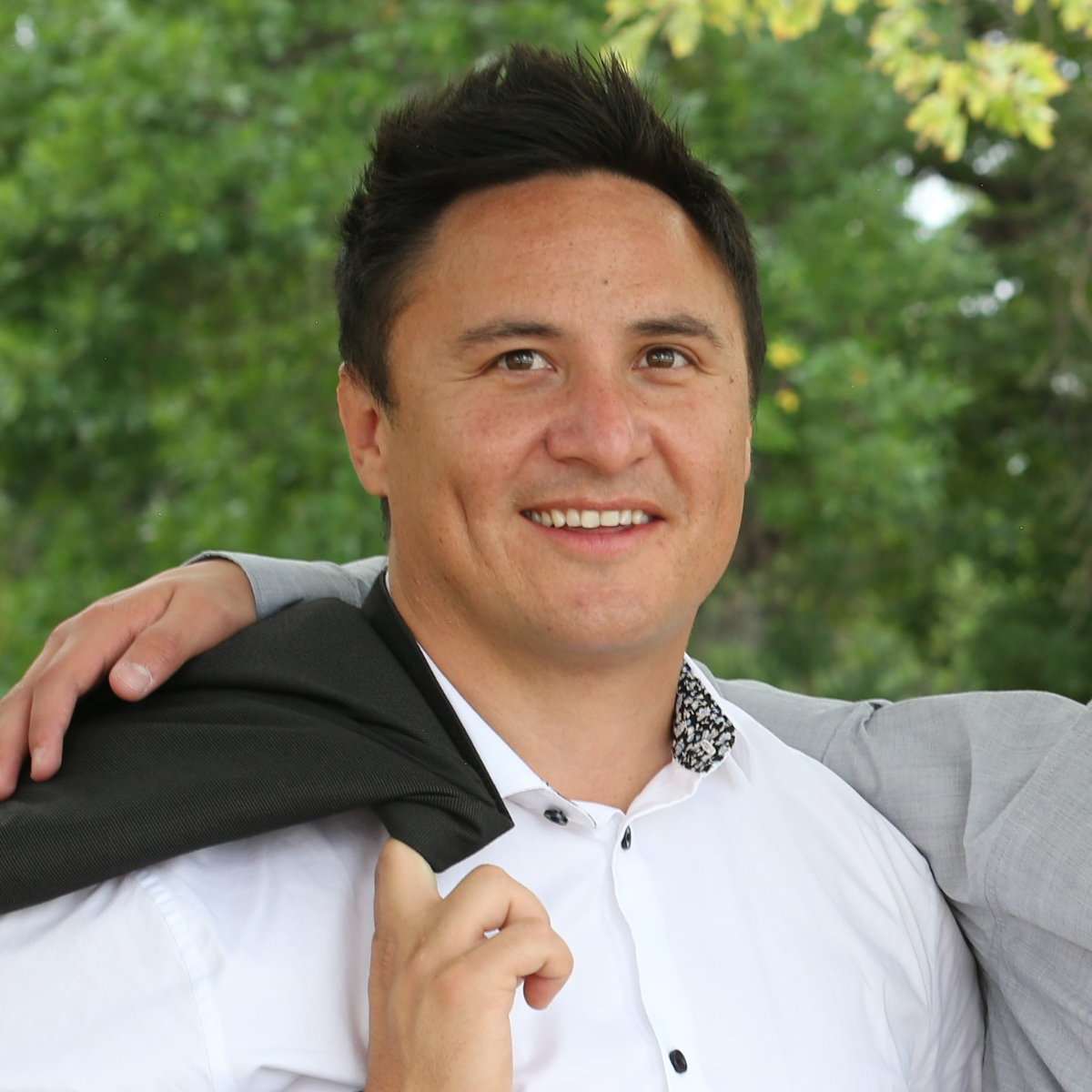
Sheldon Spotted Elk is (Tsistas—Northern Cheyenne) serves as the Chief Judge for the Ute Indian Tribal Court of Appeals, a position he has held since 2019.
Before becoming a judge, he represented children in child welfare and juvenile proceedings. He was apart of a team that reduced the amount of children in foster care by half and increased the amount of relative placement through his legal advocacy.
He is an agent of change to improve legal outcomes for children and families involved in the child welfare system. He currently works for a national foundation as a strategic partner with the now 20+ Indian Child Welfare Act (ICWA) Courts in the United States.
Sheldon has taught adjunct courses and provided many lectures at law schools throughout the country. He has authored articles on tribal law and the ICWA, including an influential article about Tribal Constitutional Reform in the Tribal Law Journal. The article stands for a call towards proximity of cultural values in law and design in Tribal systems, which was simply dinner conversations in his childhood.
Sheldon is a graduate of University of New Mexico School of Law and receive the Certificate in Federal Indian Law. He and his two sons are Tsistsas (Northern Cheyenne) and reside in Denver, Colorado.
Register
AGENDA
|
Monday, March 4 |
Lisa Weber |
|
Lisa will speak about her experience with several First Nations and their journey toward resuming jurisdiction for child and family well-being according to their own laws, referencing the impact of the recent Bill C-92 decision. |
|
|
Tuesday, March 5 |
Eleanore Sunchild |
| Lessons Learned Thus Far Being An Indigenous Woman Lawyer in a Colonial System and Stories of Healing and Love | |
| Wednesday, March 6 | Judge Gerald Morin |
|
Judge Morin will discuss the Indigenous Courts in Canada and how they are helping to shape a multi-juridical future. He will draw on his experience with the Canadian legal system and the Cree-speaking Court Circuit during his years as a judge. |
|
|
Thursday, March 7 |
Darian Baskatawang |
|
Darian Baskatawang will discuss the importance of clean water and how colonial and Indigenous law can work together on this important issue. |
|
|
Friday, March 8 |
Sheldon Spotted Elk |
|
Sheldon will discuss his experiences as a Judge in the USA and the work happening there to bring about positive change. He will discuss the Indigenous Tribal Courts in the USA and offer advice or tips on steps that Canada can take. |

Questions? Contact ilsauofa@ualberta.ca
